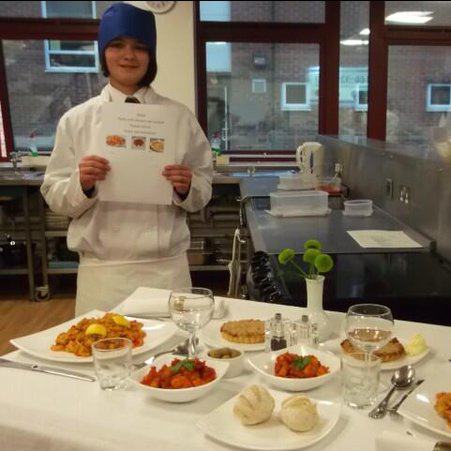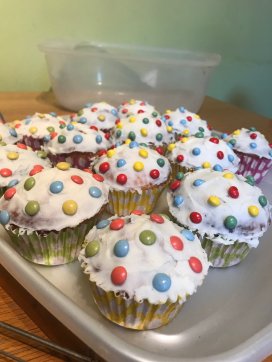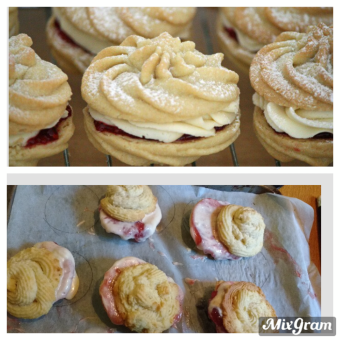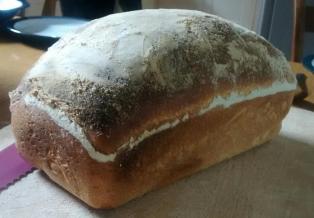My interest in cooking started at school, when I chose Catering as one of my GCSE subjects. I was very privileged to have been taught by such an encouraging, understanding and fun cookery teacher who didn’t mind that I was often slow and messy, and who transferred her passion onto me! I wasn’t very independent in the kitchen in those days, partly due to confidence and partly dyspraxia, but nevertheless she made the subject really enjoyable, engaging and interesting for me.

Since leaving school, I have had various times out of education due to a few false starts at college and mental illness – definitely not what I’d originally planned! It was during one of these difficult periods of my life where I really started to develop a love for cooking and baking. I went to various food shows to expand my knowledge and to meet/befriend some TV cooking celebrities, watched TV cooking shows and collected various cookbooks to try out new recipes and develop this useful life skill. Once I started to gain a bit more confidence socially, I even did a couple of short practical cooking and baking courses at a college over a few weeks, which I really enjoyed.

This newfound interest proved to be a great distraction and mindfulness technique for me; instead of overthinking about the future and feeling bad about myself, I was forced to focus on what I was doing in the moment, which was incredibly therapeutic. Furthermore, I had a new sense of accomplishment and purpose, as I often made the meals while my family were at work and college during the day. For its wellbeing and satisfaction benefits, this is an integral skill I am pleased to maintain and often turn to when stressed now. It has developed my fine motor skills, tidiness and cleaning, judgement and spatial awareness massively over the years.

Don’t get me wrong, I have had more cooking and baking disasters than I can count – like the time I thought the cake was ready and removed it from the tin (wrongly when still hot – I can be quite impatient!) only for it to still be raw in the middle and exploding everywhere. Or the time where I forgot to add the butter to a cake altogether. Once I set my hair on fire when boiling potatoes! (note to self: always tie long hair back.) I have also underestimated how difficult some recipes are countless times, and so have set my often unrealistic standards too high – evidently this resulted in less than perfect results much to my frustration. However, the delight of the successes outweigh the disappointment of disasters in my opinion!

The proudest I’ve felt of my baking is when I taught myself to make bread – this took trial and error, and above all a lot of patience! Although it is not necessary to make your own bread, I have found the process of kneading, proving, shaping and finally baking it incredibly rewarding, and most times it’s been successful. I also made a rainbow cake for my Granny’s 80th birthday in 2016 – it was a surprise when she cut into the cake, and it turned out better than I’d hoped. I also decorated it with fondant roses and flowers – the only cake decorating I can actually do with my dodgy fine motor skills!
Having dyspraxia does make cooking more difficult and daunting; however, with perseverance and maybe a few adaptions in the kitchen, I believe it is a skill that can be mastered. To make the process of following a recipe less confusing and easier to follow, I recommend laying the ingredients out in order of when you’re going to use them. This will act as a physical reminder when you have difficulty processing, and will also be less time consuming. Declutter your workspace before cooking, as I have discovered having a tidy space will be easier to work in! Rewriting recipes and breaking each step into smaller, more manageable chunks can make it easier to understand too. In addition, it is worth starting with small, basic recipes to start with. These will help build your confidence and develop your cooking skills further.

Fatigue plays a role in many people’s dyspraxia. Although I always enjoy it, I often find that I need a rest after preparing a meal or some sweet treats. This is unsurprising considering that we always have to work much harder and put more energy and effort into everything than anyone else, and any activity tends to take us a bit longer. If this is the case for you, consider breaking the cooking task down into sections so that you can schedule in some time for rest and come back to resume it later. You may also find pre-prepared and pre-chopped foods helpful for saving you time and energy, available in supermarkets.
Above all, cooking and baking should be a rewarding and fun process to do. For me, I often put on some feel good and motivational music while I do it – this makes it even more enjoyable. Whatever works for you, I hope you will be able to immerse yourself in the activity and feel the stress busting and feel good benefits that it brings me. Finally, please keep in mind that it is a slow learning process, and you will inevitably have a few disasters along the way!
I still might not be the fastest person in the kitchen, but I have certainly developed my tidying and independence skills.


Really enjoyed reading this. It shows what’s possible with positivity,encouragement and determination.
LikeLike
I enjoyed reading this- it shows what’s possible with positivity, encouragement and determination.
LikeLike